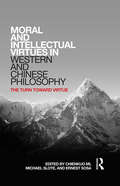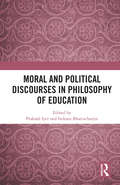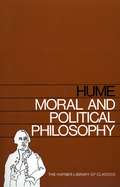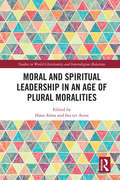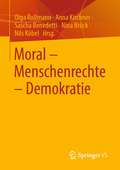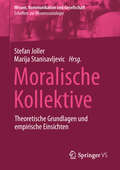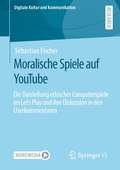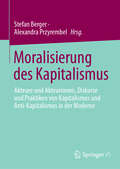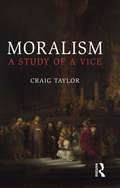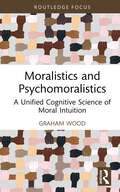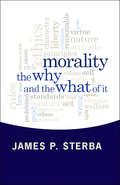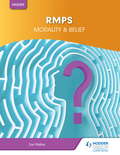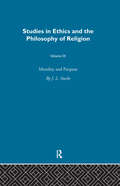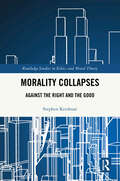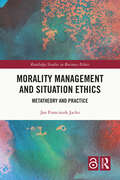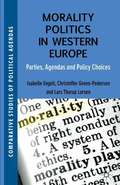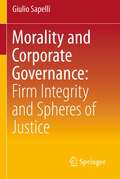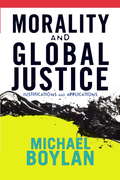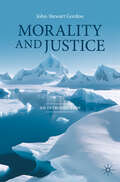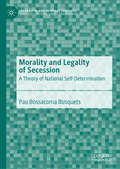- Table View
- List View
Moral and Intellectual Virtues in Practices: Through the Eyes of Scientists and Musicians
by Darcia Narvaez Mark Graves Timothy Reilly Keke Kaikhosroshvili Stefanie Israel de SouzaThis book provides an integrative interdisciplinary view of how intellectual and moral virtues are understood in two separate practices, science and music. The authors engage with philosophical and psychological accounts of virtue to understand scientists’ and musicians’ understandings of intellectual and moral virtues. They present empirical evidence substantiating the MacIntyrean claim that traditions and practices are central to understanding the virtues."
Moral and Intellectual Virtues in Western and Chinese Philosophy: The Turn toward Virtue
by Ernest Sosa Michael Slote Chienkuo MiThis is the first book to bring together Western and Chinese perspectives on both moral and intellectual virtues. Editors Chienkuo Mi, Michael Slote, and Ernest Sosa have assembled some of the world’s leading epistemologists and ethicists—located in the U.S., Europe, and Asia—to explore in a global context what they are calling, "the virtue turn." The 15 chapters have never been published previously and by covering topics that bridge epistemology and moral philosophy suggest a widespread philosophical turn away from Kantian and Utilitarian issues and towards character- and agent-based concerns. A goal of this volume is to show students and researchers alike that the (re-)turn toward virtue underway in the Western tradition is being followed by a similar (re-)turn toward virtue in Chinese philosophy.
Moral and Political Discourses in Philosophy of Education
by Prakash Iyer Indrani BhattacharjeeThis book focuses on moral and political education and critically engages with educational issues from a philosophical perspective. It engages with questions of moral education as well as questions about citizenship education, to address apprehensions on learning in a liberal democracy while parallelly invoking issues from within the curriculum, the school environment and teacher-student relationship. With contributions from renowned philosophers and educationists, this volume discusses themes like civic education and liberal democracy; toleration and freedom; Tagore’s conception of the moral and political self; key issues in moral education; cosmopolitanism, compassion, care ethics and moral purpose of schooling; to revisit and rethink some foundational questions related to education, curriculum and pedagogy. This volume will be essential reading for educationists and educators and will be important for scholars and researchers of philosophy of education, education, teacher education and school education.
Moral and Political Philosophy
by David HumeA Collection of essays from famous Scottish philosopher David Hume, one of the most prominent figures of the Scottish Enlightenment and a close friend of Adam Smith. Hume's contributions to economics are found mostly in his Political Discourses (1752), which were later incorporated into his Essays (1758).
Moral and Spiritual Leadership in an Age of Plural Moralities (Studies in World Christianity and Interreligious Relations)
by Ina Ter Avest Hans AlmaIn crisis situations, such as terror attacks or societal tensions caused by migration, people tend to look for explicit moral and spiritual leadership and are often inclined to vote for so-called 'strong leaders'. Is there a way to resist the temptation of the simplistic solutions that these ‘strong leader’ offer, and instead encourage constructive engagement with the complex demands of our times? This volume utilises relational and dialogical perspectives to examine and address many of the issues surrounding the moral and spiritual guidance articulated in globalizing Western societies. The essays in this collection focus on the concept of plural moralities, understood as divergent visions on what is a 'good life', both in an ethical, aesthetical, existential, and spiritual sense. They explore the political-cultural context and consequences of plural moralities as well as discussing challenges, possibilities, risks, and dangers from the perspective of two promising relational theories: social constructionism and dialogical self theory. The overarching argument is that it is possible to constructively put in nuanced moral and spiritual guidance into complex, plural societies. By choosing a clear theoretical focus on relational approaches to societal challenges, this interdisciplinary book provides both a broad scope and a coherent argument. It will be of great interest to scholars of social and political psychology, leadership and organization, religious studies, and pedagogy.
Moral – Menschenrechte – Demokratie
by Nina Brück Sascha Benedetti Nils Köbel Olga Rollmann Anna KirchnerDer Band konzentriert und fokussiert die Leitbegriffe Moral, Menschenrechte und Demokratie. Wie diese miteinander verwobenen sind und was sie zu gesellschaftlich und erziehungswissenschaftlich relevanten Kernthemen macht, wird in den Beiträgen zu den Themen Moral, Menschenrechte und Menschenwürdeverletzungen, Demokratiebildung sowie Partizipation analysiert und diskutiert.Eben diese thematische Breite und interdisziplinäre Ausrichtung zeichnet das Arbeiten und Forschen des Erziehungswissenschaftlers Professor Dr. Stefan Weyers aus, dessen wissenschaftliches Werk mit dieser Publikation gewürdigt wird.
Moralische Kollektive: Theoretische Grundlagen und empirische Einsichten (Wissen, Kommunikation und Gesellschaft)
by Stefan Joller Marija StanisavljevicOb Terroranschläge, Flüchtlings- oder Finanzkrisen – die Herausforderungen der globalisierten Moderne legen jene Bereiche frei, die Durkheim als anomisch bezeichnete und deren Bearbeitung nach wie vor die zentrale Stellung moralischer Kommunikation verdeutlicht. Einiges spricht dafür, dass die fortschreitende funktionale Differenzierung die Moral nicht erodieren lässt, sondern durch die zunehmende kommunikative Vernetzung geradezu eine Remoralisierung der Gesellschaft befördert. Überall dort, wo Missstände zu Tage treten und nicht abzusehen ist, wie diese im modus operandi befriedigend gelöst werden könnten, gibt die Moral ein verheißungsvolles Instrument zur Hand, das in Gestalt moralischer Kollektive den Alltag zu durchdringen und die Gesellschaft zu formen vermag. Der Sammelband widmet sich in diesem Sinne einer sowohl theoretischen wie auch empirischen Analyse der Moral, die als genuin soziale Größe über moralische Kollektive Form annimmt.
Moralische Spiele auf YouTube: Die Darstellung ethischer Computerspiele im Let’s Play und ihre Diskussion in den Userkommentaren (Digitale Kultur und Kommunikation #10)
by Sebastian FischerModerne Computerspiele erschaffen komplexe Welten, in denen sich Spielende nicht selten gezwungen sehen, kontrovers zu handeln oder schwierige moralische Entscheidungen zu treffen. Aber Spiele werden heute nicht mehr nur aktiv rezipiert. Insbesondere auf YouTube schauen Millionen Menschen täglich Videos von ‚Let’s-Playern‘, die ihre eigenen Spielerlebnisse aufzeichnen und live kommentieren. Dabei erschließen die Videoproduzenten*innen das ethische Potential der gezeigten Spiele, indem sie deren Möglichkeitsräume erkunden und ihre subjektiven Empfindungen und Entscheidungsprozesse verbalisieren. Die Rezipient*innen greifen die Inhalte der Videos wiederum auf und diskutieren darüber in den Userkommentaren. Auf diese Weise vollzieht sich eine massenhafte Distribution und Diskussion von moralischen Ideen, die weit über den virtuellen Raum YouTubes hinaus wirkt. Sebastian Fischer beschreibt dieses Phänomen ‚moralischer Let’s-Plays‘, indem er die Darstellung einiger der populärsten ethischen Computerspiele der vergangenen Jahre analysiert. Die Arbeit liefert nicht nur eine erste Deskription dieses bislang unerforschten Themas, sondern leitet auch Schlussfolgerungen ab, die sich auf den allgemeinen Prozess moralischen Spielens übertragen lassen.
Moralisierung des Kapitalismus: Akteure und Akteurinnen, Diskurse und Praktiken von Kapitalismus und Anti-Kapitalismus in der Moderne
by Stefan Berger Alexandra PrzyrembelDieses Buch fügt der wachsenden Literatur über die Geschichte des Kapitalismus einen entscheidenden Schwerpunkt auf die Moral hinzu, indem es soziale und kulturelle Perspektiven auf die kapitalistische Wirtschaftsordnung in der Moderne untersucht. Die Studie geht über die engen wirtschaftlichen Grenzen hinaus und zeichnet die Verflechtung zwischen moralischen Werten und Emotionen und dem Kapitalismus nach, wobei sowohl Kritik als auch Rechtfertigungen untersucht werden. Unternehmensinsolvenzen, Steuersysteme, Reichtum und das Geschehen an Börsen wurden aus moralischen Gründen, während Konzepte von wirtschaftlicher Gerechtigkeit und der Humanisierung des Kapitalismus die moralische Kritik überlagerten. Viele soziale Bewegungen, von der Sklavereigegnerschaft bis hin zur Arbeiterbewegung, wurden durch das Bestreben inspiriert, den Kapitalismus zu verbessern und den moralischen Verfall aufzuhalten, von dem große Teile der Gesellschaft betroffen waren. Dieses Buch geht der Frage nach, wie moralische Gefühle definiert werden und sich im Laufe der Zeit verändert haben, und wie sie sich sowohl auf den Kapitalismus als auch auf den Antikapitalismus beziehen. In Kapiteln wird anhand verschiedener sozialer Bewegungen und ethischer Fragen eine moralische Geschichte des Kapitalismus dargestellt, die nicht nur als Wirtschaftssystem, sondern als eine Ordnung verstanden wird, die alle Bereiche des modernen Lebens umfasst.
Moralism: A Study of a Vice
by Craig TaylorMoralism involves the distortion of moral thought, the distortion of reflection and judgement. It is a vice, and one to which many - from the philosopher to the media pundit to the politician - are highly susceptible. This book examines the nature of moralism in specific moral judgements and the ways in which moral philosophy and theories about morality can themselves become skewed by this vice. This book ranges across a wide range of topics: the problem of the demandingness of morality; the conflict between moral and other values; the contrast between the practice of moral philosophy and other modes of moral thought or reflection; moralism in the media; and, moralism in the public discussion of literature and art. This highly original and provocative book will be of interest to students of philosophy, psychology, theology and media, and to anyone who takes a serious interest in contemporary morality.
Moralistics and Psychomoralistics: A Unified Cognitive Science of Moral Intuition (Routledge Focus on Philosophy)
by Graham WoodThis book brings together three distinct research programs in moral psychology – Moral Foundations Theory, Cognitive Adaptations for Social Exchange and the Linguistic Analogy in Moral Psychology – and shows that they can be combined to create a unified cognitive science of moral intuition. The book assumes evolution has furnished the human mind with two types of judgement: intuitive and deliberative. Focusing on moral intuitions (understood as moral judgments that were not arrived at via a process of conscious deliberation), the book explores the origins of these intuitions, examines how they are produced, and explains why the moral intuitions of different humans differ. Providing a unique synthesis of three separate established fields, this book presents a new research program that will further our understanding of the various different intuitive moral judgements at the heart of some of the moral tensions within human society.
Morality
by James P. SterbaThis collection of essays examines what morality requires of us and why we should even be moral. They are organized around Sterba's opening essay, which attempts to answer these questions by first of all arguing that we must be moral because we are rationally compelled, but by also advancing a number of positions from a libertarian perspective about egotism and altruism, negative liberty, welfare and equality. Each of essays not written by Sterba critiques a facet of his argument. They focus mostly on the rational underpinning of morality; moral skepticism; egotism, altruism and social cooperation; and how libertarianism does not lead to welfare and equality. Sterba responds to these critiques in a final essay. The other authors are professors of philosophy with specialties in moral thinking. Annotation ©2012 Book News, Inc. , Portland, OR (booknews. com)
Morality
by James P. SterbaThis book invites philosophers and their students to consider two of the most fundamental questions in moral and political philosophy: Why be moral? And, what does morality require? Distinguished philosopher James P. Sterba presents his unique views on these topics. Sterba first argues from rationality to morality and then from morality to substantial equality. Prominent scholars Charles W. Mills, Candace A. Vogler, Anita Superson, Russ Shafer-Landau, Allan F. Gibbard, Gerald Gaus, and Tibor Machan provide thought-provoking critical responses. In the final part, Sterba addresses these critiques, inviting readers to explore the various arguments and reach their own conclusions on these fundamental questions of moral and political philosophy. Morality: The Why and What of It is an essential text for all students and scholars of ethics and political philosophy.
Morality
by James P. SterbaThis book invites philosophers and their students to consider two of the most fundamental questions in moral and political philosophy: Why be moral? And, what does morality require? Distinguished philosopher James P. Sterba presents his unique views on these topics. Sterba first argues from rationality to morality and then from morality to substantial equality. Prominent scholars Charles W. Mills, Candace A. Vogler, Anita Superson, Russ Shafer-Landau, Allan F. Gibbard, Gerald Gaus, and Tibor Machan provide thought-provoking critical responses. In the final part, Sterba addresses these critiques, inviting readers to explore the various arguments and reach their own conclusions on these fundamental questions of moral and political philosophy. Morality: The Why and What of It is an essential text for all students and scholars of ethics and political philosophy.
Morality & Belief for Higher RMPS
by Joe WalkerThe only resource for RMPS at CFE Higher level, by a bestselling author and expert in the field.Joe Walker's new full colour book provides comprehensive coverage of the newly designed CFE Higher in Religious, Moral and Philosophical Studies, but is also ideal for students across Scotland studying key topic areas in Morality and Belief as part of the broad general education and the senior phase of RME. The book:Offers lively, accessible and engaging style with appropriate humour that reflects real-life situations and moral issuesHighlights the importance of dealing with varieties of belief within religious traditionsDeals with up-to-date contemporary and topical issues in a highly practical manner
Morality & Purpose Vol 9
by J. L. StocksFirst published in 2003. Routledge is an imprint of Taylor & Francis, an informa company.
Morality Collapses: Against the Right and the Good (Routledge Studies in Ethics and Moral Theory)
by Stephen KershnarThis book argues that consequentialism and non-consequentialism are false because they face metaphysical and intuitional problems. The two theories exhaust the theories of the right, so there is no rightness.This result matters because it requires us to give up widely held beliefs regarding knowledge, moral responsibility, and reasons for action. The author’s argument is unique because it focuses on applied-ethical arguments rather than metaethical issues. Specifically, it avoids metaethical discussions of whether morality explains our thoughts and actions, how we know about morality, and whether the denial of morality is self-defeating. The author specifically argues against consequentialism and non-consequentialism in the following ways: Metaphysical Problems: Consequentialism and non-consequentialism are false because they need a theory of counterfactuals and backtracking that they cannot have Rights Problems: Non-consequentialism is false because non-consequentialism depends on rights, and people do not have rights. They do not have rights because of problems regarding moral responsibility, right-grounding, and self-ownership Circularity: Non-consequentialism is false because the basic building blocks of non-consequentialism—desert, rights, and virtue—are circular Morality Collapses will be of interest to researchers and graduate students working in normative ethics, metaethics, moral responsibility, and political philosophy.
Morality Management and Situation Ethics: Metatheory and Practice (Routledge Studies in Business Ethics)
by Jan Franciszek JackoThis book presents the philosophical assumptions of situation ethics to show the practice of morality management that follows from them. This research comprises theoretical and applied aspects: It is an investigation into metaethics that encompasses strategic and quality management problems. With the example of situation ethics, the book illustrates the role of philosophical investigations and solutions in management theory and practice. It will be of interest to researchers, academics and advanced students in the fields of business and management studies, ethics, quality management and philosophy. Furthermore, this book may be useful for senior executives and politicians charged with negotiating complicated moral quandaries and overseeing the implementation of ethical policies in their organisations and communities.
Morality Politics in Western Europe
by Christoffer Green-Pedersen Lars Thorup Larsen Isabelle EngeliWhy do some countries have 'Culture Wars' over morality issues such as abortion and same-sex marriage while other countries hardly experience any conflict? This book argues that morality issues only generate major conflicts in political systems with a significant conflict between religious and secular parties.
Morality and Corporate Governance: Firm Integrity and Spheres of Justice
by Giulio SapelliFirms, the most significant nucleus of modern economic activity, are very special social organisations with economic purposes and also a responsibility for pursuing the welfare of all ranks of society. This requires moral commitment at a subjective and collective level, i.e. ethics. In this book, a renowned author with long experience as a consultant to large firms explores the relationship between moral action and economic action with particular reference to the firm. Diverse aspects of corporate responsibility - social, civil, political, and environmental - within a rapidly changing world are investigated from a philosophical perspective. Prerequisites for self-regulation are considered and aspects of responsibility beyond the law, such as charters of values and codes of ethics, are discussed. Particular attention is paid to firm integrity and different spheres of justice, each of which has its own criteria for the distribution of goods.
Morality and Global Justice
by Michael BoylanBoylan (philosophy, Marymount U. , Virginia) presents this monograph on ethics from a globalist perspective. The work is divided into three sections covering the meta-ethical theories behind morality and global justice, normative ethics in a global context and applied examples of global ethical decision making. The volume includes case studies and each chapter provides reasoning exercises for a classroom discussion or writing prompts. Annotation ©2011 Book News, Inc. , Portland, OR (booknews. com)
Morality and Global Justice
by Michael BoylanIn this concise, single-authored text, renowned scholar and professor Michael Boylan examines the moral justifications underlying key global justice issues and provides students with the analytical tools to approach those issues critically. Introductory chapters establish a thorough but accessible foundation in theory and moral justification, and subsequent chapters apply those concepts to key areas of global concern: poverty; public health; race, gender, and sexual orientation; democracy and social/political dialog; globalization; the environment; war and terrorism; and immigrants and refugees. For easy reference and review, each chapter includes key terms, critical applied reasoning exercises (CARE), and problems and thought experiments perfect for class discussions or writing exercises. The appendix, "Getting Involved," guides students in putting ethical principles to work. An anthology of original essays, The Morality and Global Justice Reader, is also available as a complementary or a standalone text.
Morality and Global Justice
by Michael BoylanIn this concise, single-authored text, renowned scholar and professor Michael Boylan examines the moral justifications underlying key global justice issues and provides students with the analytical tools to approach those issues critically. Introductory chapters establish a thorough but accessible foundation in theory and moral justification, and subsequent chapters apply those concepts to key areas of global concern: poverty; public health; race, gender, and sexual orientation; democracy and social/political dialog; globalization; the environment; war and terrorism; and immigrants and refugees. For easy reference and review, each chapter includes key terms, critical applied reasoning exercises (CARE), and problems and thought experiments perfect for class discussions or writing exercises. The appendix, "Getting Involved,” guides students in putting ethical principles to work. An anthology of original essays, The Morality and Global Justice Reader, is also available as a complementary or a standalone text.
Morality and Justice: An Introduction
by John-Stewart GordonThis textbook is an essential primer for philosophy students embarking on their journey into the field of ethics and political philosophy. It is meticulously structured to unfold the rich tapestry of ethical discourse in a manner that is both profound and accessible to undergraduate and graduate students alike. Each chapter begins with a brief introduction, followed by an in-depth exploration of ethical concepts, and concludes with thought-provoking study questions and a curated list of further readings.
Morality and Legality of Secession: A Theory of National Self-Determination (Federalism and Internal Conflicts)
by Pau Bossacoma BusquetsThis book explores secession from three normative disciplines: political philosophy, international law and constitutional law. The author first develops a moral theory of secession based on a hypothetical multinational contract. Under this contract theory, injustices do not determine the existence of a right to secede, but the requirements to exercise it. The book’s second part then argues that international law is more inclined to accept and advance a remedial right approach to secession. Therefore, justice as multinational fairness is to be fully institutionalized under the constitutional law of liberal democracies. The final part proposes constitutionalizing a qualified right to secede with the aim of fostering recognition and accommodation of national pluralism as well as cooperation and compromise between majority and minority nations.

